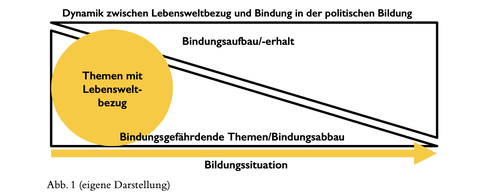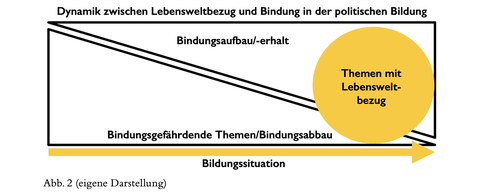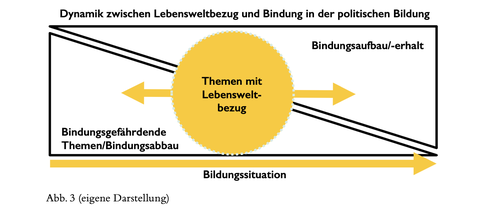Controversial and close to life - a dangerous mix for political education
Controversiality is probably one of the best known and yet most discussed standards set by the "Beutelsbacher Konsens" for political education in Germany. The term is experiencing a new boom, not least in the context of the discussion about the supposed neutrality of political education. This impulse for action discusses why civic education, which focuses in particular on controversies close to the everyday world of the addressees, sometimes enters dangerous territory and can make opportunities for active participation more difficult.
Right at the beginning: this impulse in no way wants to suggest that political education should develop a fear of controversial topics or avoid them if possible. No! All controversial topics that can be addressed within a human rights-oriented and constitutional framework should be given space in civic education. However, it is important to note that controversy can also pose a certain risk to building and maintaining bonds in civic education learning processes.
But step by step. Many years of experience within (politically) educational learning processes - especially with a focus on inclusive learning settings - have shown that joint learning is difficult or even impossible without a bond and positive emotions:
"Learning takes place in interactions that are characterized by emotional affection, e.g. in the form of recognition and belonging. Positive and empowering emotional spaces make it possible to learn in the first place, while negative and hostile environments make learning difficult or even impossible." (translated, orig. by Hölzel, Jugel 2019)
The importance of emotions and attachment will only be briefly touched on here, as it is not the focus of this impulse. However, if we follow this fundamental assumption about educational processes, the question of how attachment and emotion can be developed positively quickly arises. The following can be stated in a nutshell:
"In the context of exchange and interaction processes, emotions play a central role in learning processes, structure them and are responsible for the creation of meaning." (translated, orig. by Hölzel, Jugel 2019)
Affirming and appreciative settings are by no means alien to political education, and yet questions of belonging and emotional security in particular are a sticking point when claims of controversy come together in political education. A participant in one of our supervised studies once put it quite succinctly with the following statement:
"TTN4: „Nein, ich finde, was da nicht länger stehen sollte: Was ist, wenn wir Chef wären. Was wir verändern würden. Ja weil das ist so / da ist einerseits auch so ein bisschen wirklich Politik drin so. Weil dadurch kann man auch Freunde so verlieren, weißt du? Weil wenn jetzt einer so erzählt über Politiker und so erzählt: er (hat) auch schon geschrieben: Merkel sollte abgeschoben werden. Und schon wieder ist darin ein Politik so. Und natürlich wird es dann Diskussionen und Streitereien geben. Lieber sollte ma sowas lieber rausnehmen und was andere schreiben, weil ich glaube, wir würden / wir würden, uns würde das jetzt egal sein, wir würden ja eh kein Chef von Deutschland. Ja, weißt du.“ (#00:15:34-3#)
What is inevitable here is that, particularly at the beginning of political education processes, controversial and charged political topics are perceived as a threat to interpersonal relationships. Many topics and life-world starting points in political education programs are not only highly emotionally charged in society as a whole - they are also perceived by participants as a potential threat to bonding with others. If you ask, it becomes clear that this is by no means a fundamental rejection of controversial topics, but only that, especially in new and uncertain bonding constellations, the combination of
The reason for this is that lifeworld orientation is a double-edged sword, which on the one hand can create particularly strong motives for participation due to the proximity to one's own world of experience, but on the other hand cannot determine how these motives are positioned - i.e. whether they involve positive or rather negative emotions.
It is therefore important to note that people talk about emotional political issues in their lives with family and friends - this does not mean that they always want to do this in the context of political education. However, if more bonds are built up step by step, the willingness and consequently the scope for discussing controversial topics that are close to their lives also grows. In order to explore these possibilities, a diagnosis is required that links the interweaving of emotionally charged previous experience with topics, motives and attachment structure. In other words, we need to work with the people we work with to find out what can be talked about and what should perhaps only come up at a later stage. And once again: it's okay to have controversial opinions! Bonding does not mean harmony, but in the beginning we need topics that build bonds and are based on shared values.
Sources/special offers:
- Hölzel, T./Jugel, D.: "You can lose friends there!". Political education, emotions and bonding - clarifying a didactic error. In: Besand, A./Ovewrwien, B./Zorn, P. (eds.): Political education with feeling. Bonn: 2019, p. 246 - 266. ( free download here)
- Besand, Anja (2016): On the relationship between emotionality and professionalism in civic education. In: Heinrich Böll Foundation (ed.): Ideologies of inequality, Berlin, pp. 77-83.
- Besand, Anja; Hölzel, Tina; Jugel, David (2018): Inclusive political learning in the stadium - political education with an unknown team and an open course of play, [Weiterdenken - heinrich-Böll-Stiftung Sachsen] Dresden. Available at:
- Damasio, Antonio R. (2013): The Spinoza Effect. How feelings determine our lives, Berlin.
- Euler, Dieter (2014): Design Research - a paradigm under development. In: Euler, Dieter/ Sloane, F.E. Peter (eds.): Designed-Based Research, Stuttgart, pp.15-44.
- Feuser, Georg/Jantzen, Wolfgang (2014): Attachment and dialog, In: Feuser, Georg/Herz, Birgit/Jantzen, Wolfgang: Emotion and personality, Stuttgart, pp. 64-90.
- Fischer, Kurt W. (2008). Dynamic cycles of cognitive and brain development. Measuring growth in mind, brain, and education. In Battro, A. M./Fischer.K. W./ Léna, P. (Eds.), The educated brain,. Cambridge U.K. pp. 127-150.
- Gessner, Susann (2014): Political education as a space of possibility, Schwalbach/Ts.
- Grammes, Tilman (1998): Kommunikative Fachdidaktik - Politik - Geschichte - Recht Wirtschaft, Wiesbaden.
- Gozolino, Louis (2007): The neurobiology of human relationships, Kirchzarten.
- Heidenreich, Felix (2012): Attempt at an overview: political theory and emotions. In: Ders./Schaal, Gary (eds.): Political Theory of Emotions, Baden-Baden: 9-28.
- Henkenborg, Peter (2013): Civic education for democracy: learning democracy as a culture of recognition. In: Hafeneger, Benno; Henkenborg, Peter; Scherr, Albert (eds.): Pädagogik der Anerkennung. Foundations, concepts, fields of practice, Schwalbach/Ts., pp. 106-131.
- Herz, Birgit (2017): Emotion and personality. In: Feuser, Georg/Herz, Birgit/Jantzen, Wolfgang: Emotion and personality, Stuttgart, pp. 17-37.
- Jantzen, Wolfgang (2010): Allgemeine Behindertenpädagogik, Band 1. Sozialwissenschaftliche und psychologische Grundlagen. Weinheim.
- Jantzen, Wolfgang (2012): In the beginning was meaning. On the natural history, psychology and philosophy of activity, meaning and dialog. Berlin.
- Petri, Annette (2018): Emotion-sensitive political education. Consequences of emotion research for the theory and practice of political education, Frankfurt am Main.
- CHüRE, ALLAN N. (2003): On the neurobiology of attachment between mother and child. In: Heidi Keller (ed.): Handbuch der Kleinkindforschung. 3rd, corrected, revised and expanded ed. Bern: Hans Huber.
- Schröder, Achim (2017): Emotionalization of politics and authoritarianism.
- Challenges for contemporary political education. Available at: 2017, https://transfer-politische-bildung.de/fileadmin/user_upload/Fotos/Dossiers/Schroeder_Achim-Emotionalisierung_der_Politik_Vortrag_22-06-17_Weimar.pdf (18.04.2018)
- Spitz, René A. (1970): No and Yes. The origins of human communication, Stuttgart.
- Spitz, René A. (1976): On dialog. Stuttgart.
- Steffens, Jan (2016): Mental development paths between inclusion and exclusion. In: Professional Association of Curative Education Nurses in Germany (ed.): HEP Information. 38th year 3/2016. Krumbach. 33-40.
- Von Unger, Hella (2014): Participatory research - Introduction to research practice, Wiesbaden.



